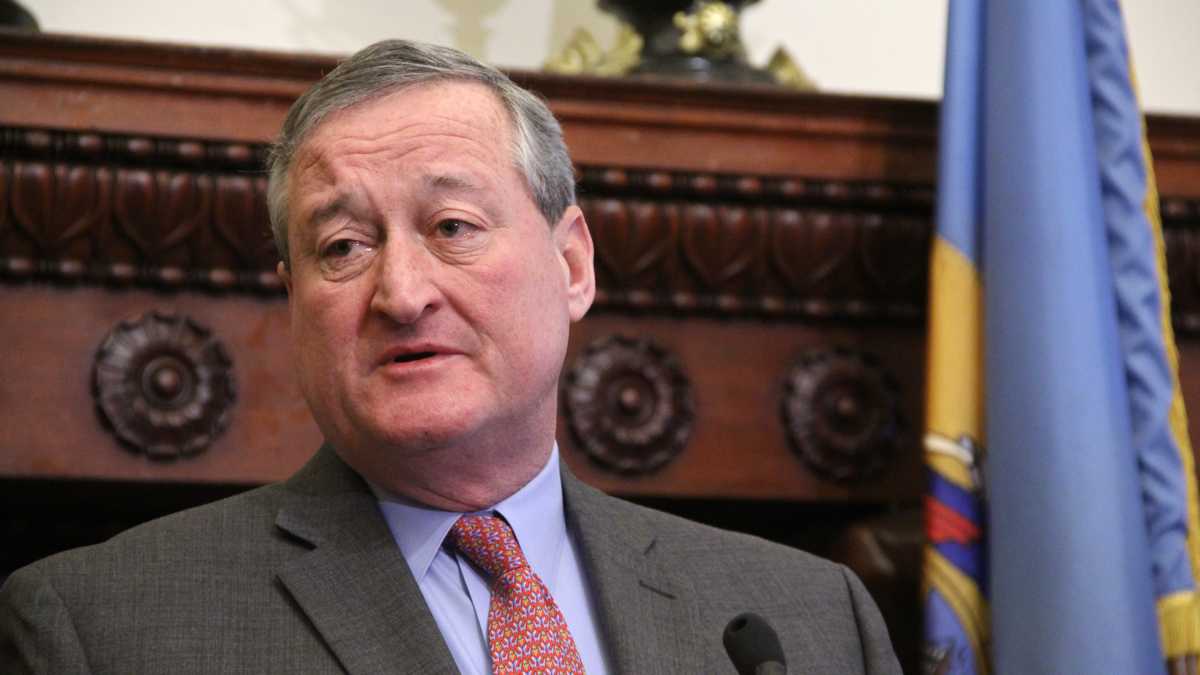Who’s going to stop and frisk the white guys on St. Patrick’s Day?

Mayor Jim Kenney has tweaked his stance on stop-and-frisk since his 2015 campaign. (Emma Lee/WHYY, file)
Double standards run amok during celebrations like this in Philadelphia. Here’s to hoping our police break the cycle this year.
On a recent Saturday afternoon, I was called the n-word by a drunken white Philadelphian dressed in green at the 11th and Market SEPTA transit stop. Surrounded by a crowd of his friends — he was carefree, bold, and unapologetic.
If I had been as carefree and bold, and responded physically to the slur, I would have certainly been taken into police custody and fined. However, there was nothing more I could do but get off at the stop and head to my destination.
It was another pre-St. Patrick’s Day festivities annoyance. This year, as in every year, in the weekends leading up to March 17, I knew I could expect to see public intoxication and urination run rampant — with the possibility of being disrespected and dismissed.
However, this time I wanted Mayor Kenney, who is under criticism for being lax on his initial push to fight off stop and frisk in the city, to know how I was feeling. I sent him a tweet that the SEPTA police picked up.
@MrErnestOwens Looping in SEPTA Transit Police @TNestel3 . ^AS
— SEPTA_SOCIAL (@SEPTA_SOCIAL) March 5, 2016
They quickly responded that they were sending someone to the site.
Transit Police are here to serve! We like to meet chuckleheads like this. When you see them, call us at 215.580.8111 https://t.co/ndVaUV31pd
— Thomas J. Nestel III (@TNestel3) March 5, 2016
But I’m not easily impressed. I know my status in this city as a privileged black Penn grad who’s also a known journalist. Of course, the mayor didn’t have to directly respond to my tweet, but whoever runs his social media made sure someone did and fast.
Yet, that firmness and responsiveness makes me question why such services weren’t at that SEPTA stop in the first place — or how anywhere in University City, for that matter, as so much drunkenness also took place in the streets.
There’s a racial double standard when it comes to police authority during such social events in Philadelphia.
During my time at Penn, Penn Relays was a very social time for the Black Greek community. Black fraternities and sororities from all over the region would visit the area for step shows, yard stomp contests, and various other highly visible black events.
Ask any young black man who attended those festivities, and he might have a story about being stopped and frisked while just walking on campus, or being heavily monitored by the police in general. I couldn’t help but be annoyed every time police asked to see my student ID on those weekends without any specific reason. I felt like a second-class citizen at my own university (which constantly pats itself on the back for being inclusive and diverse).
Nonetheless, as I look at the last couple of weekends, University City, Center City, and elsewhere seemed to be a cesspool of reckless partying that didn’t have the same high level of security and monitoring that my black body has been subjected to since birth.
It’s not like the police don’t know what can happen during such affairs. These pre-holiday weekend festivities have become a staple in a city that prides itself on being a little more Irish than others. So why aren’t the stop-and-frisk transgressions that plague people of color in this city transferred to those drunken white Philadelphians that might demonstrate “suspicious behavior” as well?
It’s become almost expected that those who are white and who engage in public misconduct and racist and homophobic behavior might get away with it, if all they can expect from the city is a slap on the wrist. Remember the Mummer’s Parade on New Year’s Day? Where were the police or the mayor’s office when it came time to actually enforce severe rules to prevent such behavior?
Answer: Nowhere. The city continues to hear more criticism, but I see no strong response to end this public display of racial bias. If I can’t rally in the streets with a crowd of blacks without having to show my ID or be searched for random suspicion, what prevents white St. Patty’s patrons from being subjected to the same experience?
Nothing should, and at this point I’m publicly requesting that the Philadelphia Police Department and the mayor’s office step up to increase security during all public events as an act of fairness and safety.
Not too many people will take kindly to being called racial slurs in environments where they don’t feel safe. And no Philadelphian should expect such behavior to appear to be tolerated by our public servants.
WHYY is your source for fact-based, in-depth journalism and information. As a nonprofit organization, we rely on financial support from readers like you. Please give today.

